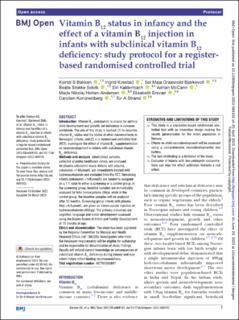| dc.contributor.author | Bakken, Kjersti Sletten | |
| dc.contributor.author | Kvestad, Ingrid | |
| dc.contributor.author | Bjørkevoll, Sol Maja Graasvold | |
| dc.contributor.author | Solvik, Beate Stokke | |
| dc.contributor.author | Kaldenbach, Siri | |
| dc.contributor.author | McCann, Adrian | |
| dc.contributor.author | Holten-Andersen, Mads Nikolaj | |
| dc.contributor.author | Ersvær, Elisabeth | |
| dc.contributor.author | Konijnenberg, Carolien | |
| dc.contributor.author | Strand, Tor Arne | |
| dc.date.accessioned | 2023-06-30T10:46:57Z | |
| dc.date.available | 2023-06-30T10:46:57Z | |
| dc.date.created | 2023-04-21T10:37:44Z | |
| dc.date.issued | 2023 | |
| dc.identifier.issn | 2044-6055 | |
| dc.identifier.uri | https://hdl.handle.net/11250/3074697 | |
| dc.description.abstract | Introduction: Vitamin B12 (cobalamin) is crucial for optimal child development and growth, yet deficiency is common worldwide. The aim of this study is twofold; (1) to describe vitamin B12 status and the status of other micronutrients in Norwegian infants, and (2) in a randomised controlled trial (RCT), investigate the effect of vitamin B12 supplementation on neurodevelopment in infants with subclinical vitamin B12 deficiency.
Methods and analysis: Infant blood samples, collected at public healthcare clinics, are analysed for plasma cobalamin levels. Infants with plasma cobalamin <148 pmol/L are immediately treated with hydroxocobalamin and excluded from the RCT. Remaining infants (cobalamin ≥148 pmol/L) are randomly assigned (in a 1:1 ratio) to either a screening or a control group. In the screening group, baseline samples are immediately analysed for total homocysteine (tHcy), while in the control group, the baseline samples will be analysed after 12 months. Screening group infants with plasma tHcy >6.5 µmol/L, are given an intramuscular injection of hydroxocobalamin (400 µg). The primary outcomes are cognitive, language and motor development assessed using the Bayley Scales of Infant and Toddler Development at 12 months of age.
Ethics and dissemination: The study has been approved by the Regional Committee for Medical and Health Research Ethics (ref: 186505). Investigators who meet the Vancouver requirements will be eligible for authorship and be responsible for dissemination of study findings. Results will extend current knowledge on consequences of subclinical vitamin B12 deficiency during infancy and may inform future infant feeding recommendations. | en_US |
| dc.language.iso | eng | en_US |
| dc.publisher | BMJ | en_US |
| dc.rights | Navngivelse-Ikkekommersiell 4.0 Internasjonal | * |
| dc.rights.uri | http://creativecommons.org/licenses/by-nc/4.0/deed.no | * |
| dc.title | Vitamin B12 status in infancy and the effect of a vitamin B12 injection in infants with subclinical vitamin B12 deficiency: study protocol for a register-based randomised controlled trial | en_US |
| dc.type | Journal article | en_US |
| dc.type | Peer reviewed | en_US |
| dc.description.version | publishedVersion | en_US |
| dc.rights.holder | Copyright 2023 the authors | en_US |
| dc.source.articlenumber | e069102 | en_US |
| cristin.ispublished | true | |
| cristin.fulltext | original | |
| cristin.qualitycode | 1 | |
| dc.identifier.doi | 10.1136/bmjopen-2022-069102 | |
| dc.identifier.cristin | 2142414 | |
| dc.source.journal | BMJ Open | en_US |
| dc.identifier.citation | BMJ Open. 2023, 13 (4), e069102. | en_US |
| dc.source.volume | 13 | en_US |
| dc.source.issue | 4 | en_US |

